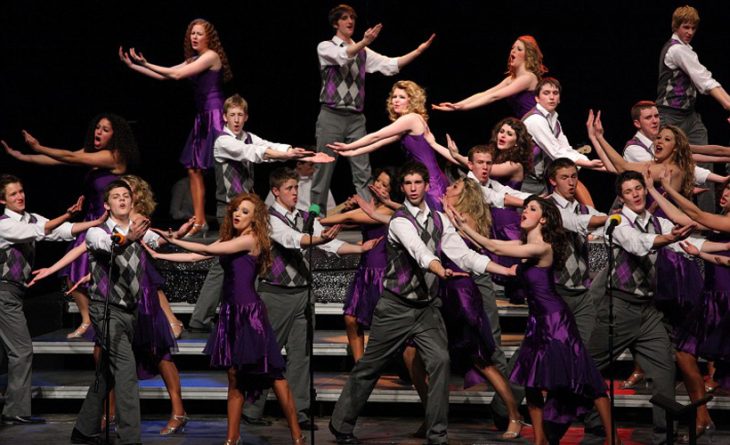
Word of the Day: Glee
Today’s word of the day, courtesy of the Old English Wordhord app, is glee. According to dictionary.com, glee has two definitions: 1. “open delight or pleasure; exultant joy; exultation”; and 2. “an unaccompanied part song for three or more voices, popular especially in the 18th century.” But it is a good bit more complicated than that when you look at the history of the word. In fact, the word that actually appeared on the Wordhord app was glīw-word, which means “word of a song, song, or poem.”
According to etymonline.com, glee comes from “Old English gliu, gliw, gleow ‘entertainment, mirth (usually implying music); jest, play, sport,’ also ‘music’ and ‘mockery,’ presumably from a Proto-Germanic *gleujam but absent in other Germanic languages except for the rare Old Norse gly ‘joy;’ probably related to the group of Germanic words in gl- with senses of ‘shining; smooth; radiant; joyful’ (compare glad), from PIE root *ghel- (2) ‘to shine.’” The website says that in Old English it was a “poetry word” but that it become obsolete sometime between1500 and 1700: “it somehow found its way back to currency late 18c. In Old English, an entertainer was a gleeman (female gleo-mægden).” Just a reminder, the * before a word from Proto-IndoEuropean (PIE) or from Proto-Germanic means that we do not have direct evidence, like a document, with that word; the word has been reconstructed based upon linguistic principles.
In addition to what it says about the Old English background of glee, etymonline says, “Glee club (1814) is from the secondary sense of ‘musical composition for three or more solo voices, unaccompanied, in contrasting movement’ (1650s), a form of musical entertainment that flourished 1760-1830.” When I was in high school, “Glee Club” is what the school called the chorus. At the time, I just assumed that it meant people who bring gladness to others through song. I had no idea that a glee was a song and that the word actually dated from the Old English period.
Another word connected to the PIE *ghel- is the English word glad, which comes from Old English glæd. But the Old English has a stronger sense than the modern word; it means “’bright, shining, gleaming; joyous; pleasant, gracious,’” according to etymonline.com, which says further, “Apparently the notion is of being radiant with joy; the modern sense ‘feeling pleasure or satisfaction’ is much weakened.” Semantic weakening is a linguistic phenomenon (also called semantic bleaching, semantic loss, and semantic reduction, among other things. Philip Durkin says that the phenomenon occurs “where the semantic content of a word becomes reduced as the grammatical content increases, for instance in the development of intensifiers such as awfully, terribly, horribly (e.g. awfully late, awfully big, awfully small) or pretty (pretty good, pretty bad . . .)” (The Oxford Guide to Etymology. Oxford University Press, 2009). So the bright joyousness of Old English glæd has become, “Glad to meet you.”
The image is of a glee club setting some kind of record: https://reductress.com/post/high-school-glee-club-holds-world-record-for-longest-harmonized-yasssssss/.